Posts by Christopher Lochhead
083 The Problem With Your Marketing Plan
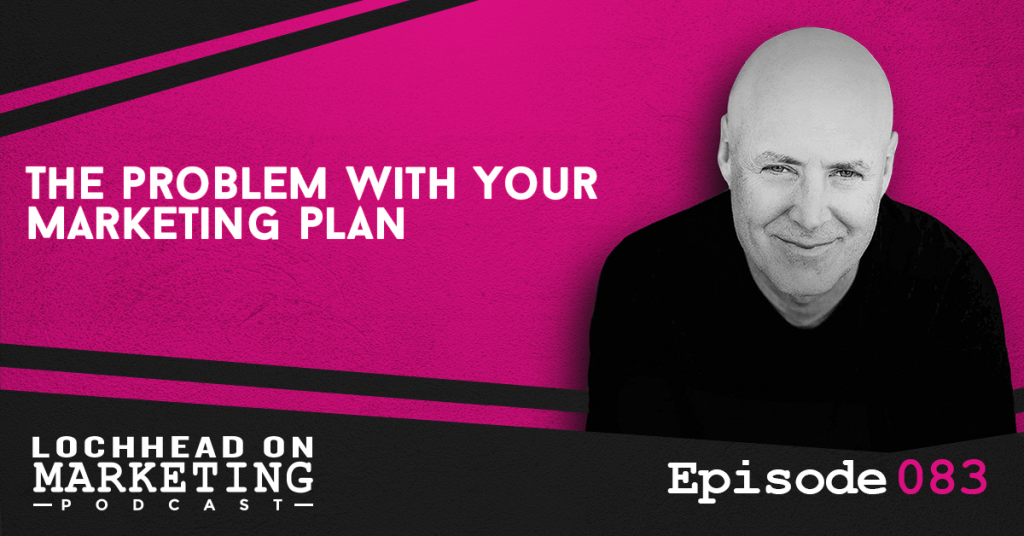
Podcast (lochheadonmarketing): Play in new window | Download (Duration: 13:55 — 9.6MB) | Embed
Subscribe: Apple Podcasts | Spotify | RSS | More
On this episode, let’s talk about what the problem with your marketing plan might be in specifically three areas. Number one, calling it a “plan” might be a problem. Number two, it’s actually a legendary marketing plan that is about more than just marketing. Lastly, number three, your relationship with your CFO and finance team might be a problem, but I’m hoping it won’t be when we’re done.Create A Marketing Framework
Chris describes what a “plan” entails and how an actual marketing plan should be fluid and should be consistently open for changes and adjustments. He suggests calling it more of a “framework” than a plan. Lastly, he gave some important valuable points on which marketing activities to invest on.“So as you start thinking about planning and budgeting, put things into big buckets, but assume change. That’s why calling it a framework might be a more powerful thing.” – Christopher Lochhead
Involving Everyone On The Team
A marketing plan (or framework) is more than just marketing. Chris describes how you should have a valuable relationship with the Head of Product or Engineering and Finance in plotting your plans for the company.“Drive a highly cross functional process with the team, interacting with marketing, sales, finance, customer support, and potentially other organizations to gather their input.” – Christopher Lochhead
Develop a Relationship With The CFO
Collaboration with other executives within your firm is very important in executing your marketing framework. Chris shares first hand experience as a CMO and how he developed a relationship with their CFO. He has some significant tips on how to adjust marketing investments that ultimately benefit Finance.“If you work well with your CFO, marketing can be a place to park cash.” – Christopher LochheadTo know more about the problem with your marketing plan, download and listen to this episode.
Bio:
Christopher Lochhead is a #1 Apple podcaster and #1 Amazon bestselling co-author of books: Niche Down and Play Bigger.
He has been an advisor to over 50 venture-backed startups; a former three-time Silicon Valley public company CMO and an entrepreneur. Furthermore, he has been called “one of the best minds in marketing” by The Marketing Journal, a “Human Exclamation Point” by Fast Company, a “quasar” by NBA legend Bill Walton and “off-putting to some” by The Economist. In addition, he served as a chief marketing officer of software juggernaut Mercury Interactive. Hewlett-Packard acquired the company in 2006, for $4.5 billion. He also co-founded the marketing consulting firm LOCHHEAD; was the founding CMO of Internet consulting firm Scient, and served as head of marketing at the CRM software firm Vantive. We hope you enjoyed this episode of Lochhead on Marketing™! Christopher loves hearing from his listeners. Feel free to email him, connect on Facebook, Twitter, Instagram, and subscribe on Apple Podcast! You may also subscribe to his newsletter, The Difference, for some amazing content.195 Neil Pearlberg, Santa Cruz Surf & Skateboard Podcast Legend
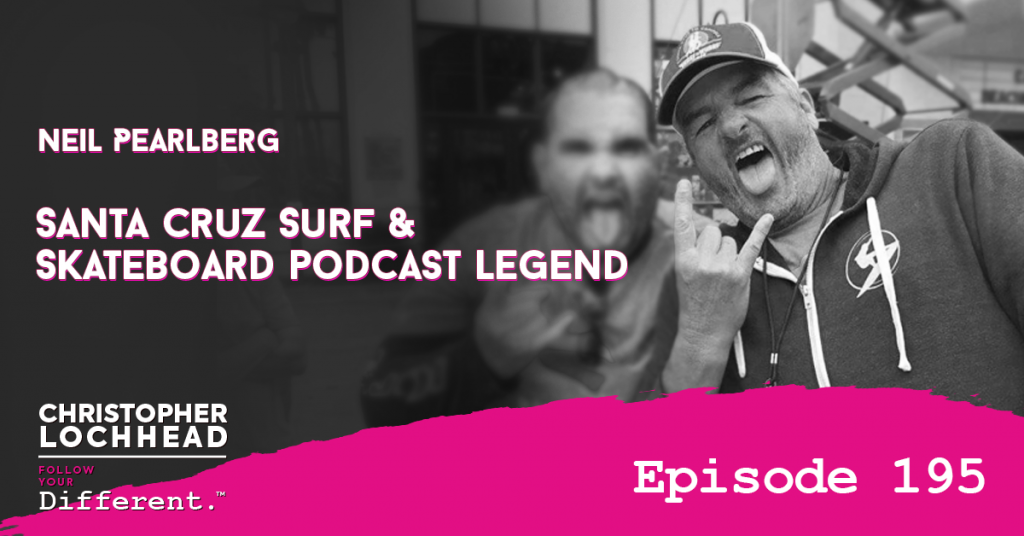
Podcast: Play in new window | Download (Duration: 1:09:26 — 47.7MB) | Embed
Subscribe: Apple Podcasts | Spotify | Pandora | RSS | More
Imagine sitting on a wonderful backdoor deck, overlooking the vast beautiful bluey green Pacific ocean as sets of waves. Roll in on a perfect warm sunny fall day in beautiful Santa Cruz, California. Then imagine a funny, ADHD infused conversation between two buddies with the beers and tequila flowing. Well, that’s what we have today, with none other than Santa Cruz, icon, surf/skate legend, host of the mega popular podcast Off The Lip, Neil Pearlberg. In this episode, we get silly. We swear a lot and have tons of fun. I invite you to crack open a cold one and join Chris and Neil for a lot of fun.Bio:
Since September 2009, Neil Pearlberg has written over 200 articles covering the sport of surfing, as well as skateboarding, and soccer, for the Bay Area News Group, & Santa Cruz Waves. He is also the host of the “Off the Lip Radio Show”, & Hour Local Radio Show aired on Santa Cruz Radio Show KSCO AM 1080, FM 104.1, ksco.com and streamed on Santa Cruz Waves Facebook Page. Neil has also published articles in Adventure Sports Journal, National Geographic, Stand Up Paddle Board Magazine.Links:
Off the Lip Radio Instagram: @offthelipradioshow Twitter: @offthelipradio Linkedin: Neil Pearlberg We hope you enjoyed this episode of Follow Your Different™! Christopher loves hearing from his listeners. Feel free to email him, connect on Facebook, Twitter, Instagram, and subscribe on iTunes!082 How Category Designers Do Acquisitions: Why Salesforce/Slack Is a Savvy Deal
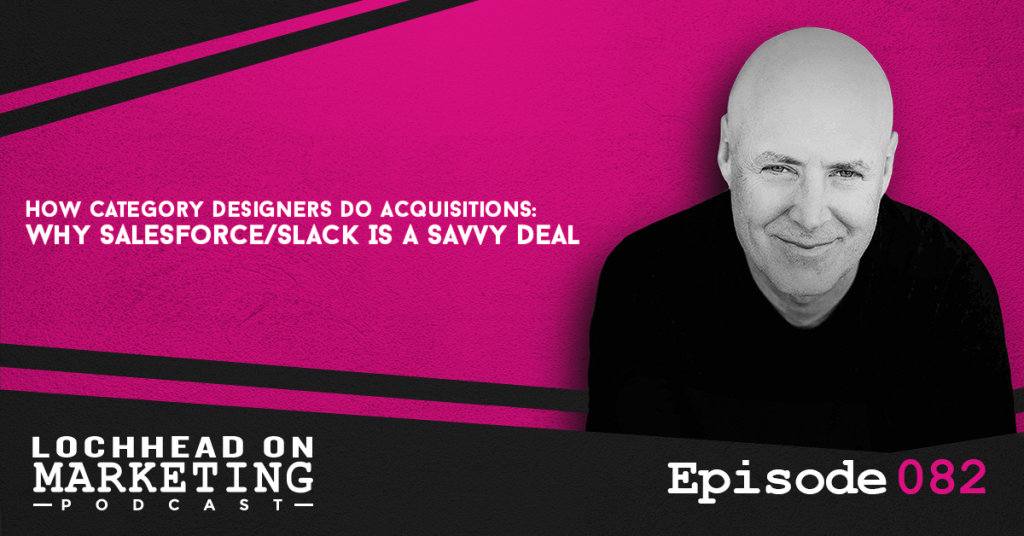
Podcast (lochheadonmarketing): Play in new window | Download (Duration: 13:44 — 9.4MB) | Embed
Subscribe: Apple Podcasts | Spotify | RSS | More
Most people look at acquisitions through a spreadsheet lens. Of course the financials matter for mergers and acquisition deals, but when viewed through a category design lens, acquisitions look very, very different. In this episode, we break down the differences using the Salesforce / Slack Deal as an example and Google purchasing YouTube way back 2006.
Two Types of M&A Deals
First one is category consolidation deals, which is usually done in market categories that are slow or have no growth. The second type of M&A deals are category acceleration deals, which happens in early or high growth market categories.
In line with this, let’s step back in memory lane, October of 2006, when Google purchased YouTube For $1.65B. YouTube was two years old then with just 65 employees. Many experts said predictable things like “how can Google be so stupid” “they paid so much for a company with little revenue, no profits.”
“In 2006, google didn’t buy YouTube’s technology, customers, or revenue or profits. Google was the category queen in Search and they bought the category queen in Video. They bought the #1 position in category. A category with massive potential. Potential, that some others could not see.” – Christopher Lochhead
Youtube: #2 Search Engine In The World
Legendary new categories are often obvious to most people, in hindsight. To put a fine point on this one: in 2019 YouTube did $15B in Ad sales. Google made a category acceleration deal. They redesigned part of the category landscape on the internet and they’ve been benefiting as a result ever since then
“Think of what could have happened to Google if Microsoft, Yahoo, Disney or someone else owned Youtube? As Internet categories were getting designed and redesigned, without YouTube, Google could have found its ass on the floor in the game of category musical chairs.” – Christopher Lochhead
Salesforce $28 billion Deal To Buy Slack
After Salesforce bought Slack for $28billion, their stock got hammered down to 11%. In fact, headline of MarketWatch.com is: Salesforce stock drops as Wall Street questions necessity of Slack purchase.
“Now there is an epic mega category battle going down for the new distributed, digital workplace. Here’s what they don’t get…Salesforce just increased their odd in this epic category battle.” – Christopher Lochhead
To know more about How Category Designers Do Acquisitions: Why Salesforce/Slack Is a Savvy Deal, download and listen to this episode.
Bio:
Christopher Lochhead is a #1 Apple podcaster and #1 Amazon bestselling co-author of books: Niche Down and Play Bigger.
He has been an advisor to over 50 venture-backed startups; a former three-time Silicon Valley public company CMO and an entrepreneur.
Furthermore, he has been called “one of the best minds in marketing” by The Marketing Journal, a “Human Exclamation Point” by Fast Company, a “quasar” by NBA legend Bill Walton and “off-putting to some” by The Economist.
In addition, he served as a chief marketing officer of software juggernaut Mercury Interactive. Hewlett-Packard acquired the company in 2006, for $4.5 billion.
He also co-founded the marketing consulting firm LOCHHEAD; was the founding CMO of Internet consulting firm Scient, and served as head of marketing at the CRM software firm Vantive.
Links:
Salesforce acquires Slack for over $27 billion, marking cloud software vendor’s largest deal ever
Salesforce to Acquire Slack for $27.7 Billion
Google to buy YouTube for $1.65 billion in stock
A Decade Ago, Google Bought YouTube — and It Was the Best Tech Deal Ever
Google buys YouTube for $1.65 billion
We hope you enjoyed this episode of Lochhead on Marketing™! Christopher loves hearing from his listeners. Feel free to email him, connect on Facebook, Twitter, Instagram, and subscribe on Apple Podcast! You may also subscribe to his newsletter, The Difference, for some amazing content.
081 Marketing Fail: Sherwin-Williams Vs. Ocean Spray
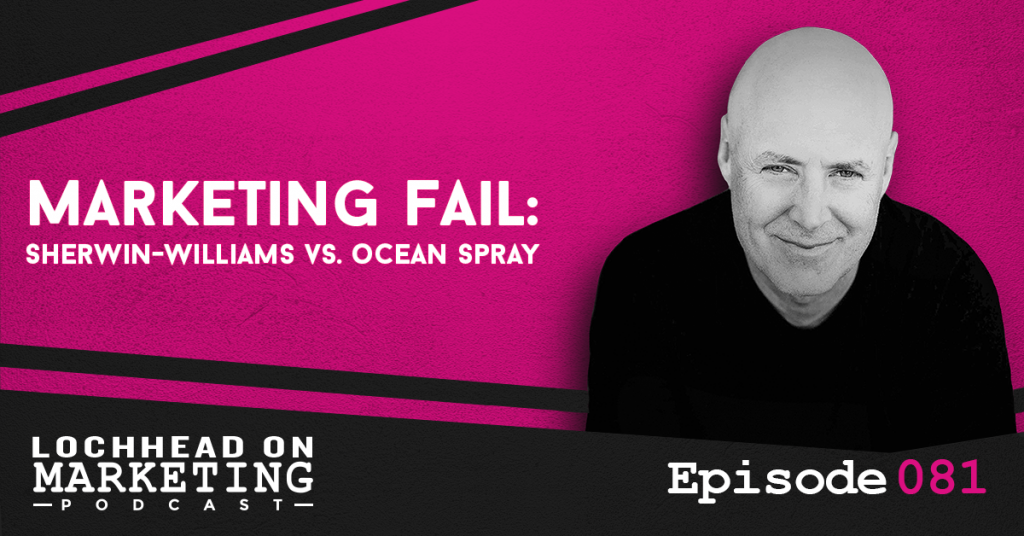
Podcast (lochheadonmarketing): Play in new window | Download (Duration: 9:29 — 6.5MB) | Embed
Subscribe: Apple Podcasts | Spotify | RSS | More
In today’s episode, we dig into two how two companies approached a viral situation. First, Ocean Spray’s positive trendjack in response to Nathan Apodaca’s viral TikTok video. Second, is how Sherwin-Williams fired an employee who created viral Tiktok videos mixing paints. We ask the seminal question, how can you be more like Ocean Spray?
Marketing Wins and Fails
When Nathan Apodaca’s Tik Tok video went viral (he was skateboarding, drinking his Ocean Spray, singing Fleetwood Mac’s “Dreams”), newly appointed Ocean Spray CEO, Tom Hayes took action. It was the trendjack of the year and Tom Hayes took it to a whole new level. It ultimately gave Ocean Spray positive PR.
Now, on the other hand, when Tony Piloseno, an Ohio University senior, who worked part-time at Sherwin Williams created a set of popular paint videos on TikTok, he got fired. What’s worse: Piloseno said he actually pitched Sherwin Williams Corporate Marketing Team the idea of being more active on TikTok with some of his videos.
“Piloseno says it took TWO MONTHS to get in touch with corporate marketing and they ‘basically told me that there wasn’t really any promotions going onso there wasn’t a need to see the presentation.’ %$#@!!!!” – Christopher Lochhead
What Savvy CEOs and CMOs Do
Do you work for a company like Ocean Spray or Sherwin Williams? If you want to be more like Ocean Spray, how do we do that? Most companies today, if they are smart, they have social media marketing departments trying to create what this guy has created.
“Savvy CEOs and CMOs invest heavily in creating legendary digital content. leaders want to share knowledge, they have a point of view, and as a result, they are mobilizing communities, they are creating movements and ultimately, they are growing their category and brands through a thought leadership owned media and earned media strategy.” – Christopher Lochhead
Seminal Questions To Ask
Christopher narrates one of his conversations with Robert Rosenberg, the former CEO of Dunkin Donuts. He and his team capitalized on one franchisee discovering a potential product, the munchkins and that is a great example providing support to your team.
“This brings us three seminal questions for all of us Marketers, number 1, are you building an Ocean Spray or Sherwin Williams-like culture? Number 2, are you encouraging radical creativity amongst your people and number? Number 3, are you building a digital owned media strategy and capability?” – Christopher Lochhead
To know more about marketing fail: Sherwin-Williams Vs. Ocean Spray story, download and listen to this episode.
Bio:
Christopher Lochhead is a #1 Apple podcaster and #1 Amazon bestselling co-author of books: Niche Down and Play Bigger.
He has been an advisor to over 50 venture-backed startups; a former three-time Silicon Valley public company CMO and an entrepreneur.
Furthermore, he has been called “one of the best minds in marketing” by The Marketing Journal, a “Human Exclamation Point” by Fast Company, a “quasar” by NBA legend Bill Walton and “off-putting to some” by The Economist.
In addition, he served as a chief marketing officer of software juggernaut Mercury Interactive. Hewlett-Packard acquired the company in 2006, for $4.5 billion.
He also co-founded the marketing consulting firm LOCHHEAD; was the founding CMO of Internet consulting firm Scient, and served as head of marketing at the CRM software firm Vantive.
We hope you enjoyed this episode of Lochhead on Marketing™! Christopher loves hearing from his listeners. Feel free to email him, connect on Facebook, Twitter, Instagram, and subscribe on Apple Podcast! You may also subscribe to his newsletter, The Difference, for some amazing content.
194 The Life of A Legendary Songwriter w/ Nashville Songwriters Hall of Famer Sharon Vaughn
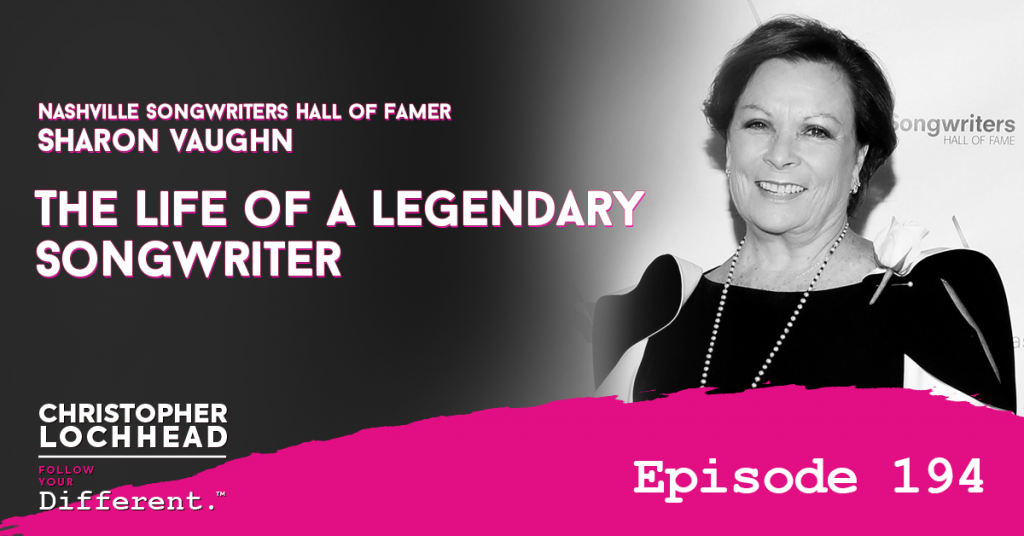
Podcast: Play in new window | Download (Duration: 1:06:45 — 45.8MB) | Embed
Subscribe: Apple Podcasts | Spotify | Pandora | RSS | More
Today, we go deep into the life, lessons and learnings of a legendary musician, singer, producer, and songwriter Sharon Vaughn. Sharon has written hits for legends like Willie Nelson, Waylon Jennings, Reba McEntire, The Oak Ridge Boys, George Jones, Kenny Rogers, Randy Travis, Patty Loveless, Agnes, and Kate Ryan. In 2019 Sharon was inducted into the Nashville Songwriter’s Hall of Fame.
If you’re a creative person, if you love music and if you find inspiration in stories of amazing triumph, you’ll love this episode. Pay special attention to Sharon’s thoughts on the grand dame of country music, Dolly Parton.
A Creative Writing Instrument
Sharon discusses her professional and personal background and how she developed an interest in singing and songwriting. She goes into detail about how her writing process has been a schizophrenia lifestyle.
“It’s a very difficult line to walk because if you’re writing for strictly commercial, it gets vapid. If you’re writing strictly for an emotional purging, then it gets selfish and self centered. But if you walk that straight and narrow line between commercial and genuine emotion. That’s where the tension lies.” – Sharon Vaughn
Admiration of Musical Genius
Sharon continues to discuss her professional journey. She lets us in on her joys and difficulties of what it was like to work as a harmony singer. Further, she shares what it was like working with Jimmy Buffet, Porter Wagoner, Bill Anderson, and Dolly Parton.
Nashville Songwriters Hall of Fame
Sharon describes her excitement and her thankfulness for being inducted to Nashville Songwriters Hall of Fame. Further, she expresses her gratefulness to the people along the way who have been instrumental to her life. This all had contributed to her becoming a great listener and a legendary storyteller.
“Everybody on this planet has a story. Most of them are very eager for you to hear it, to tell it. All you have to do is have enough curiosity to listen and respect what they’re saying. You have to realize that everybody in this world is worthy of listening to. I, for one, have been the recipient of listening to people and that’s the main thing I’m most grateful for. ” – Sharon Vaughn
To know more about the legendary Sharon Vaugh and her incredible life journey, download and listen to this episode.
Bio:
Vaughn moved to Nashville in her early 20s. In 1974, she charted two singles as a performer for Cinnamon Records: a duet with Narvel Felts titled “Until the End of Time”, and “Never a Night Goes By”. A year later, she signed with Dot Records and released a third single, “You and Me, Me and You”. She was also the lead singer in the Lea Jane Singers, and worked with the Jordanaires, the Nashville Edition and The Holladay Sisters.
Vaughn’s first big songwriting success was Waylon Jennings (1976) “My Heroes Have Always Been Cowboys.” Willie Nelson later popularized the song in 1980 for the soundtrack of the movie The Electric Horseman.
Her next songwriting hit was The Oak Ridge Boys (1977)’s “Y’all Come Back Saloon.” Since then she has worked with country artists such as Dolly Parton, Waylon Jennings, George Jones, Tammy Wynette, Tanya Tucker and Kenny Rogers. Vaughn was a nominee for the Nashville Songwriters Hall of Fame three times, and was inducted in 2019.
Vaughn has during the last couple of years had over 100 cuts with European artists and four number ones in Japan. She has worked with several Swedish Idol artists including the winner Jay Smith (2010) and a number one hit for Ola. She has also worked with many Scandinavian songwriters and artists including Agnes, Mutt Lange, Tony Nilsson, Vendela, Anders Hanson and Emilia.
In 2009, her co-written song Release Me by Swedish pop artist Agnes reached #1 on the U.S Billboard Dance Club Songs Chart.[8] In 2013, Vaughn received a JASRAC Award as #1 of the Top 10 Foreign Works for her 2011 co-written song “Rising Sun” by the Japanese pop band EXILE.
During 2014, Vaughn competed as the songwriter of three songs in Melodifestivalen.
Vaughn has also co-written songs with Ian Dench[11] and Carl Falk.
Links:
Nashville Songwriters Foundation Hall of Fame
My Heroes Have Always Been Cowboys – Waylon Jennings
My Heroes Have Always Been Cowboys – Willie Nelson
Wikipedia – My Heroes Have Always Been Cowboys
We hope you enjoyed this episode of Follow Your Different™! Christopher loves hearing from his listeners. Feel free to email him, connect on Facebook, Twitter, Instagram, and subscribe on iTunes!
080 3 Ideas To Have A Legendary Marketing Career to 50 and Beyond
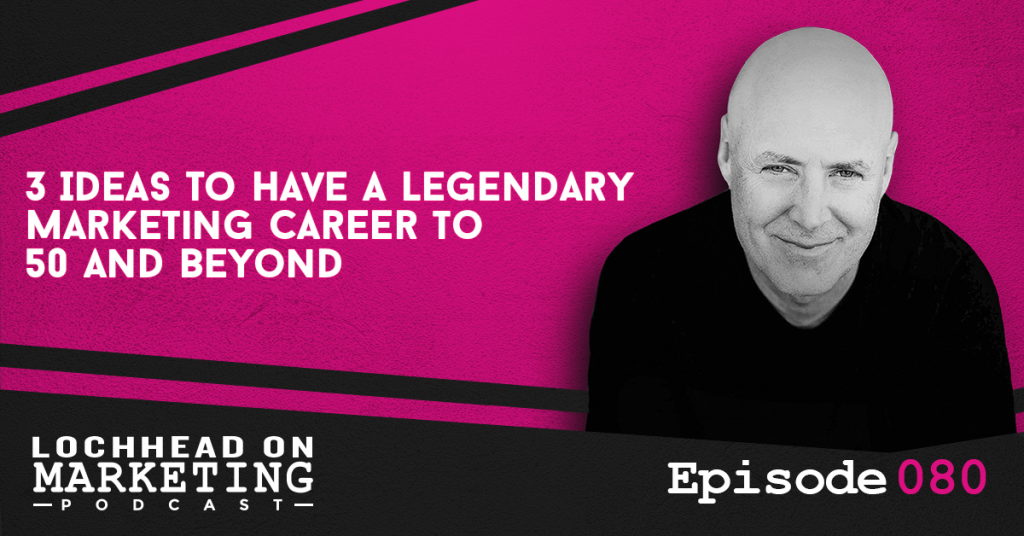
Podcast (lochheadonmarketing): Play in new window | Download (Duration: 13:32 — 9.3MB) | Embed
Subscribe: Apple Podcasts | Spotify | RSS | More
At a time when career uncertainty is high and the need for economic security has maybe never been higher, let’s talk about three ideas on how you can have a legendary marketing career to 50 and beyond. If you’re younger or older than 50, Chris has got some ideas for you in this episode.
Ageism In Business
During the last episode with Dave Gerhardt, CEO of Privy, there was a question that popped up around the possibility of having a career in marketing past the age 50. Chris thinks there’s ageism in business broadly and certainly, in the tech business as well. He further shares facts from an Harvard Business Review that says, “seven out of 18 top Silicon Valley companies having a median age of 30 or younger.”
“In addition, a study conducted by the San Francisco federal reserve bank showed that callback rates for jobs for older people, older applicants were much less. And with women having lower callback rates than men, additionally, more research from Stanford. The Stanford center on longevity says that, contrary to popular belief, older workers are healthy and have a strong work ethic and tend to be very loyal to their employers and are more likely to be satisfied with their jobs than their younger coworkers.” – Christopher Lochhead
If You Are Over 50
Some may claim that younger professionals have more energy to fulfill work. However, London Business School published a study which showed that people under 45 were exhausted. So now, Chris advises listeners, ages 50 and above, to become known for a niche that you own.
“You don’t want to be just a generic marketing person. What you want to be is recognized as an expert, as a guru, as a Yoda, as a sensei in a particular type or style or approach or discipline of marketing said in a simple way, niche down.” – Christopher Lochhead
3 Ideas For Your Career
Number one, ask yourself the Seminole question, “what am I great at that few others are great at, that also delivers the most economic value.” Step two, niche down hard on that superpower skill. Third, name yourself in your niche, claim it and frame it.
“Now you know that your personal niche is working for you. You become known for a niche that you own. As that happens, as you age and, assuming you stay current, you do legendary work. You have to produce legendary results. There’s no question about it. Of course, you have to build great relationships. So you do those other smart things along with being known for a niche that you own.” – Christopher Lochhead
To know more about the 3 Ideas To Have A Legendary Marketing Career to 50 and Beyond, download and listen to this episode.
Bio:
Christopher Lochhead is a #1 Apple podcaster and #1 Amazon bestselling co-author of books: Niche Down and Play Bigger.
He has been an advisor to over 50 venture-backed startups; a former three-time Silicon Valley public company CMO and an entrepreneur.
Furthermore, he has been called “one of the best minds in marketing” by The Marketing Journal, a “Human Exclamation Point” by Fast Company, a “quasar” by NBA legend Bill Walton and “off-putting to some” by The Economist.
In addition, he served as a chief marketing officer of software juggernaut Mercury Interactive. Hewlett-Packard acquired the company in 2006, for $4.5 billion.
He also co-founded the marketing consulting firm LOCHHEAD; was the founding CMO of Internet consulting firm Scient, and served as head of marketing at the CRM software firm Vantive.
Links:
5 Ways to Respond to Ageism in a Job Interview
Silicon Valley has an age problem
Study using fake resumes shows widespread age discrimination
Our Assumptions About Old and Young Workers Are Wrong
We hope you enjoyed this episode of Lochhead on Marketing™! Christopher loves hearing from his listeners. Feel free to email him, connect on Facebook, Twitter, Instagram, and subscribe on Apple Podcast! You may also subscribe to his newsletter, The Difference, for some amazing content.
193 Ryan Holiday NY #1 Best Seller On “Lives Of The Stoics”
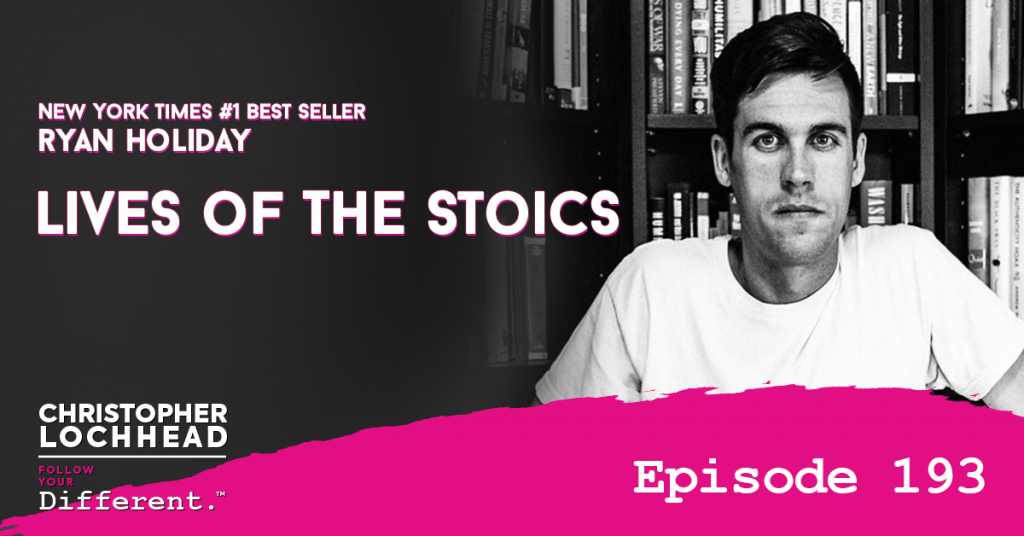
Podcast: Play in new window | Download (Duration: 1:17:52 — 53.5MB) | Embed
Subscribe: Apple Podcasts | Spotify | Pandora | RSS | More
We continue our run on legendary authors today with none other than NY #1 Best Selling Author, Ryan Holiday. You see, the only authors we ever have are the ones that we think have ideas, teachings, and stories that are worth digging into.
Today, we go deep into the teachings of some of the greatest thinkers in history. Ryan helps us see the events of today through the lens of powerful philosophers and history, providing today, in an incredible context. We deal with big topics like truth, character, pain, and suffering humor, and a lot more.
Invest Time in Reading
Chris lauded Ryan for writing a historical book in the age where almost everyone is addicted to selfies. Ryan was actually amazed himself how in this age and time, people still invest in time and money reading books. He shares what he thinks about good books and why people still opt for a book, instead of getting validation in social media.
“I opened the book, there’s a story about Xenos, the founder of Stoicism. You get this prophecy as a young man that the Oracle tells him ‘you will become wise when you begin to have conversations with the dead.’ Years later at a chance encounter in a bookstore, do you come to realize that this prophecy was about reading, that books are a way to speak to the dead.” – Ryan Holiday
Condensed Life Experiences
Ryan and Chris discuss life-changing books. Ryan shares an anecdote from Socrates saying: “the reason you read is that you gain quite easily what others learned quite painfully.” He further describes his new book Lives Of The Stoics, as something less about him and more about the wisdom of the past.
“Reading is condensed information. It’s distilled down information. In reading one book, you could jump forward a year of your life, or 10 years of your life. It can save you painful trial and error.” – Ryan Holiday
An Escape and Reassurance
Ryan further shares what he thinks about good books being an escape and reassurance. Reading books, especially historical ones, will make you realize that you are not alone dealing with your feelings or that there are universal truths that span from generations. One of which is human struggling and the fight between good and evil.
“I find whenever I’m stressed about what’s happening, I try to study the past. This gives me a clear view of what’s happening right now.” – Ryan Holiday
To know more about Ryan Holiday and his new NY best-selling book, Lives of the Stoics, download and listen to this episode.
Bio:
Ryan Holiday is one of the world’s foremost thinkers and writers on ancient philosophy and its place in everyday life.
He is a sought-after speaker, strategist, and the author of many bestselling books including The Obstacle Is the Way; Ego Is the Enemy; and The Daily Stoic.
He’s newest book Lives Of The Stoics is an instant New York Times Advice & Business Bestseller, USA Today Bestseller, and Wall Street Journal #1 Bestseller.
His books have been translated into over 30 languages and read by over two million people worldwide. He lives outside Austin, Texas, with his family.
Links:
Amazon – Lives of the Stoics: The Art of Living from Zeno to Marcus Aurelius
We hope you enjoyed this episode of Follow Your Different™! Christopher loves hearing from his listeners. Feel free to email him, connect on Facebook, Twitter, Instagram, and subscribe on iTunes!
079 How To Be A Legendary CMO w/ Dave Gerhardt
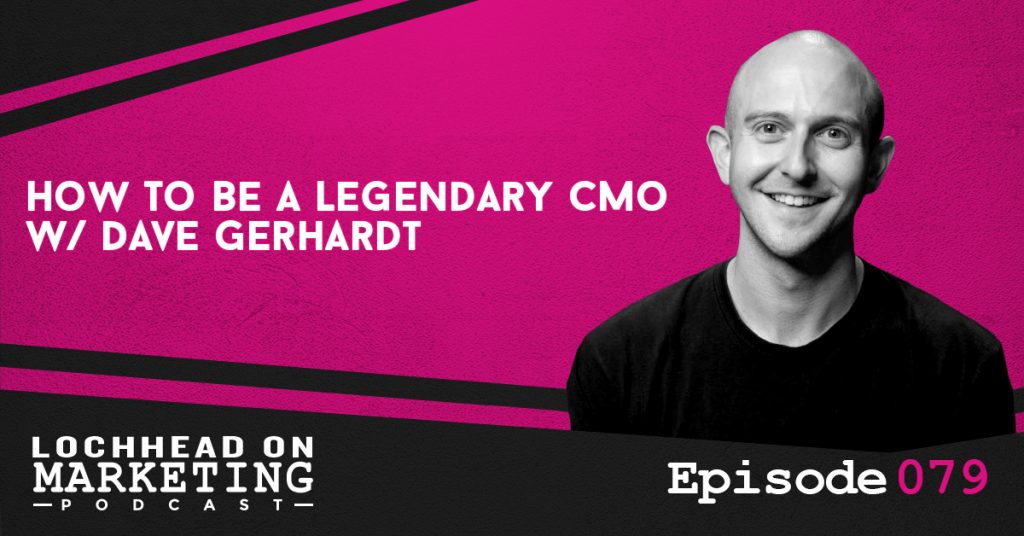
Podcast (lochheadonmarketing): Play in new window | Download (Duration: 1:12:13 — 49.6MB) | Embed
Subscribe: Apple Podcasts | Spotify | RSS | More
In this episode, one of the most high profile CMOs in the tech world, Dave Gearhart, aka DG, CMO of Privy is here. We have a fantastic conversation from marketing, planning to category, design, and more. Christopher recently guested on his podcast, which is called B2B Marketing Leaders. In a lot of ways, this conversation is a continuation of that conversation. It’s one younger CMO with one older CMO, we’ll let you decide who’s who. He’s also got an awesome new marketing group on Facebook called Digi MG. To know more about how to be a legendary CMO, download and listen to this episode.Bio:
Dave Gerhardt is a B2B marketing leader & widely regarded as one of today’s leading brand builders. Prior to Privy Dave was VP of Marketing at Drift where he helped the company grow into one of the fastest growing B2B SaaS businesses of all-time. His work has been featured in Forbes, Fortune, Inc., Entrepreneur, TechCrunch, and Harvard Business Review, and he’s the co-author of the definitive book on Conversational Marketing, which was a #1 new release on Amazon in Marketing & Sales and a top 20 business book in the U.S. He lives in Boston with his wife and two kids.Links:
Linkedin: Dave Gerhardt Privy Twitter: @davegerhardt The B2B Marketing Leaders Podcast Patreon: @davegerhardt Privy: Dave Gerhardt We hope you enjoyed this episode of Lochhead on Marketing™! Christopher loves hearing from his listeners. Feel free to email him, connect on Facebook, Twitter,Instagram and subscribe on iTunes! You may also subscribe to his newsletter,The Difference, for some amazing content.192 How Heroes Fight Wildfires w/ CAL FIRE Chief Jonathan Cox & ZoneHaven CEO Charlie Crocker
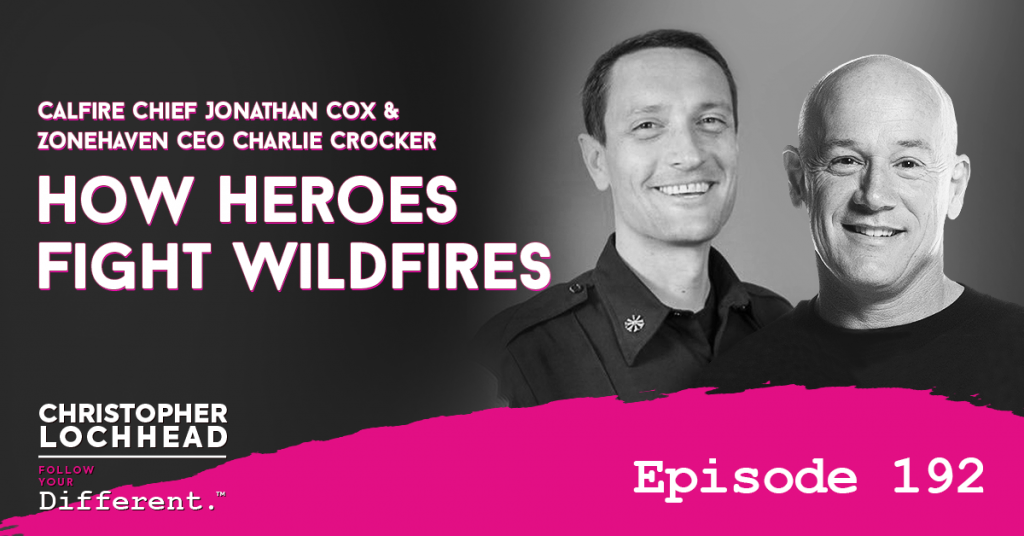
Podcast: Play in new window | Download (Duration: 1:20:51 — 55.5MB) | Embed
Subscribe: Apple Podcasts | Spotify | Pandora | RSS | More
In this episode, a truly legendary conversation with two extraordinary men, men who are on a mission to stop deadly wildfires. First, we have Charlie Croker, the founder and CEO of Zone Haven. Zone Haven is using data to everything technologies, to help government agencies and citizens both plan for and respond to serious disasters.
Our second guest is Chief Jonathan Cox, CalFire Executive who is responsible for fire operations in this region.
Together, Charlie and Jonathan share how firefighting heroes stop these fires and save countless lives and billions in property.
A Night Californians Will Never Forget
The night of Saturday, August 15 2020, a massive lightning storm hit the region. Approximately 12,000 strikes of lightning hit Northern California which caused massive fires. The wildfire lasted for weeks and it destroyed almost 10,000 buildings along with the big basin redwoods State Park, and took the life of one person.
“It was a horrifying fire and it started eating the mountainous area that has a lot of underbrush, some of the most beautiful ancient redwoods, and a lot of wonderful homes, towns and businesses.” – Christopher Lochhead
The Worst Fire Season In History
Chief Jonathan Cox recounted to Chris how they had expected the worst for the wildfire season. However, they did not expect this horrible incident to have grown into that magnitude. He further explained their process and prioritization and how technology from Zone Haven has contributed a lot to their firefighting efforts.
“We’re very good when there’s one or two large fires burning, getting an incident management team assembled and getting resources drawn throughout the system. But this really was one of those moments where you had concurrent major emergencies happening in a small geographical area, really in the Bay Area, and a little bit north, and it really turned into a prioritization of resources based on the threat to humans and the threat to structures.” – Chief Jonathan Cox
Saving Lives and Properties
Charlie Crocker, from Zone Haven shares the technology as it relates to helping CalFire make sound decisions during that emergency. He further shares in this episode how their communication strategy, along with the CalFire executives, were in sync and were out of the box, that it made drastic results in terms of preventing more damages.
“The main focus of it and why we’re called Zone Haven is that we really focus on very small neighborhoods or zones. So these zones are smart. They know the number of people, they know how quick, how long it’s going to take for people to get out of there.” – Charlie Crocker
To know more about How Heroes Fight Wildfires and for more information about CAL FIRE Chief Jonathan Cox & ZoneHaven CEO Charlie Crocker, download and listen to this episode.
Bio:
CAL FIRE Deputy Chief Jonathan Cox
CalFire Deputy Fire Chief Jonathan Cox oversees fire operations at the San Mateo County Division of CAL FIRE, which includes San Mateo County Fire Department and Coastside Fire Protection District.
His passion for the fire service started young, prior to his current role he worked both municipal and wildland fire field operations with CAL FIRE at Coastside Fire District, San Mateo County Fire Department and San Luis Obispo County Fire Department.
In addition, he spent several years as the Northern California spokesperson for CAL FIRE. Jonathan was also a founding member for CAL FIRE’s land use planning program at the Office of the State Fire Marshal (OSFM), working with local jurisdictions to make informed land use decisions related to the threat of wildfire.
Jonathan also responds to, and manages, some of California’s largest disasters. He spent five years as a member of CAL FIRE’s Incident Management Team 6 (FEMA Type 1), where he served on the command staff in the capacity of Public Information Officer (PIO1).
He holds a Bachelors Degree from Cal Poly, San Luis Obispo and a Masters Degree from the University of Copenhagen, Denmark.
He has also completed an intensive training at the United Nations Institute for Training and Research (UNITAR) in Geneva, Switzerland.
Jonathan is a State of California (OSFM) certified Chief Officer and Registered Instructor.
Additionally, Jonathan is an emergency response educator and trainer in the field of emergency management and crisis communications.
He has been a subject matter expert speaker at numerous conferences, including the National Fire Protection Association. His work has spanned five countries and involved working with hundreds of professionals.
He has lived in the US, Denmark and the United Kingdom.
Charlie Crocker, Founder/CEO Zonehaven
Charlie is the Co-Founder and CEO of Zonehaven Inc.
He is a data geek and entrepreneur with more than 25 years of experience building teams to bring data out of the shadows and drive business value.
Prior to Zonehaven, he built Autodesk’s first big data platform team to support migration to subscription and the cloud. He also led product management for Autodesk’s flagship AutoCAD product line.
Prior to Autodesk he was co-founder in a start-up focused on spatial databases and web-based tools for state and local government agencies and utility companies.
Charlie has a passion for growing young leaders.
He mentors MBA and MSBA students at UC Davis and California College of the Arts.
Links:
DONATIONS: CZU Lightning Complex fire: Give help, get help
Linkedin: Chief Cox
Twitter: @firechiefcox
Website: ZoneHaven.com
Linkedin: Charlie Crocker
We hope you enjoyed this episode of Follow Your Different™! Christopher loves hearing from his listeners. Feel free to email him, connect on Facebook, Twitter, Instagram, and subscribe on iTunes!

